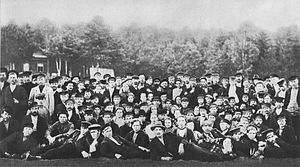Soviet (council)
[1] This ended later that year with the October Revolution, during which the Second Congress of Soviets proclaimed itself as the supreme governing body of the country.
"Soviet" is derived from a Russian word meaning council, assembly, advice, harmony, or concord,[trans 1] and all ultimately deriving from the Proto-Slavic verbal stem of *vět-iti "to inform", related to the Slavic "věst" ("news"), English "wise", the root in "ad-vis-or" (which came to English through French), or the Dutch "weten" ('to know'; cf.
However, in his memoirs, the Russian anarchist Volin claims that he witnessed the beginnings of the St Petersburg Soviet in January 1905.
In 1905, as the Russo-Japanese War (1904–1905) increased the strain on Russian industrial production, the workers began to strike and rebel.
Soviets emerged as inclusive bodies to lead workers, and to organize strikes and to politically and militarily fight the government of Russian empire mainly through direct action, with the primary actors being socialist revolutionaries and anarchists, as Lenin's party was a minority.
These bodies were supposed to hold things together under the provisional government until the election of a constituent assembly could take place; in a sense, they were vigilance committees designed to guard against counter-revolution.
[2] At the beginning of the Revolution, these soviets were under control of the Socialist Revolutionary Party, and even the Mensheviks had a larger share of the elected representatives than the Bolsheviks.
John Reed, an American eyewitness to the October Revolution, wrote, "Until February 1918 anybody could vote for delegates to the Soviets.
For example, during the regime of the Provisional Government there was bourgeois representation in the Petrograd Soviet – a delegate of the Union of Professional Men which comprised doctors, lawyers, teachers, etc.
"[7] Similarly, Leon Trotsky wrote in Terrorism and Communism (1920) that "In Petrograd, in November 1917, we also elected a Commune (Town Council) on the basis of the most democratic voting, without limitations for the bourgeoisie.
They would have remained there up to the first Social Revolutionary and Cadet rising, after which ... they would probably have been arrested if they did not leave the Council in good time, as at a certain moment did the bourgeois members of the Paris Commune.
"[8] Vladimir Lenin wrote that the soviets were originally politically open and inclusive entities, writing in The Proletarian Revolution and the Renegade Kautsky (1918) that, "the disenfranchisement of the bourgeoisie is not a necessary and indispensable feature of the dictatorship of the proletariat.
And in Russia, the Bolsheviks, who long before October put forward the slogan of proletarian dictatorship, did not say anything in advance about disenfranchising the exploiters.
A code of rules governing elections to the soviets was framed in March 1918, but the following classes were disqualified to vote: "Those who employ others for profit; those who live on incomes not derived from their own work – interest on capital, industrial enterprises or landed property; private business men, agents, middlemen; monks and priests of all denominations; ex-employees of the old police services and members of the Romanov dynasty; lunatics and criminals.
Local constituents within the factory and village soviet would compile a list of what they want the government to do, and the role of the elected delegates was to carry out the given tasks.
There were very few full time administrative workers or state functionaries; instead, many citizens would take part in the day-to-day running of the government.
The Union Republics, Provinces and Town Soviets had jurisdiction to run their own industry, take censuses, employ more doctors, teachers, and nurses, build schools, libraries and hospitals so long as it did not directly conflict with the national policy.
In practice deputies in a soviet often worked in standing committees and carried out functions with the help of unpaid volunteers (the aktiv - Russian: актив).
Eisner, an eccentric and well known figure in Munich, succeeded in carrying out a bloodless coup with a few hundred men on 7 November 1918, occupying the seat of parliament and government, and proclaiming a republic.
[28] On 1 May 1919, the German Army, along with local Bavarian Freikorps, overthrew the nascent republic, massacring several hundred persons in the process, including many non-Communist.



